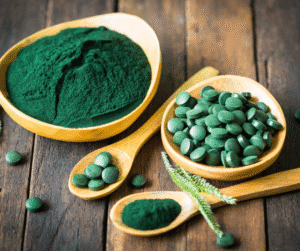Spirulina: A Nutritional Powerhouse for Whole-Body and Gut Health

Spirulina, a blue-green microalga scientifically known as Arthrospira platensis and Arthrospira maxima, has become widely recognized for its dense nutrient profile and diverse therapeutic potential. Its beneficial effects span cardiovascular health, immune modulation, metabolic support, and gut microbiota regulation, making spirulina a versatile supplement grounded in scientific evidence.
Spirulina’s Nutritional Composition
Spirulina is an exceptional source of nutrients:
- Protein: Constitutes 60-70% of dried weight, containing all essential amino acids with a high biological value (BV=75) and excellent digestibility.
Biological value (BV) is a measure of how well the body can use a protein. A higher BV means the protein provides amino acids in a ratio closer to human needs, making it more efficient for tissue building and repair. - Vitamins and Minerals: Rich in antioxidant vitamins A, C, E, B-complex, and minerals such as iron, calcium, magnesium, zinc, chromium, and copper critical for enzymatic processes and immune defense.
- Essential Fatty Acids: Contains gamma-linolenic acid (GLA), an omega-6 fatty acid involved in anti-inflammatory pathways.
- Bioactives: Phycocyanin and allophycocyanin are pigmented proteins with potent antioxidant (neutralizing harmful free radicals) and anti-inflammatory properties.
Comprehensive Health Benefits Backed by Science
Spirulina’s therapeutic potential is supported by substantial scientific evidence across various body systems and health domains:
Cardiovascular Health
Clinical trials and meta-analyses consistently demonstrate spirulina’s positive cardiovascular effects:
- Blood Pressure Reduction: Supplementation leads to statistically significant decreases in systolic (pressure when heart beats) and diastolic (pressure when heart rests) blood pressure, with greater reductions observed in treatments longer than 12 weeks. Spirulina’s antioxidants help improve the function of the endothelium (inner lining of blood vessels), promoting vasodilation (widening of blood vessels), which lowers blood pressure.
- Improvement of Lipid Profiles: Spirulina lowers total cholesterol, low-density lipoprotein (LDL, the “bad” cholesterol), and triglycerides while increasing high-density lipoprotein (HDL, the “good” cholesterol). This helps reduce atherosclerosis risk, which is the buildup of plaques that narrow arteries.
Anti-Inflammatory Effects and Immune Modulation
- Reduction of C-Reactive Protein (CRP): CRP is a protein made by the liver in response to inflammation. Elevated CRP levels are a general marker of systemic inflammation and linked to chronic diseases like heart disease and diabetes. Spirulina supplementation significantly reduces CRP, especially after more than 8 weeks and in individuals with high baseline CRP (>5 mg/L).
- Cytokine Modulation: Cytokines are small proteins critical in cell signaling, especially in immune responses. Pro-inflammatory cytokines like interleukin-6 (IL-6) and tumor necrosis factor-alpha (TNF-α) drive inflammation. Spirulina reduces these, while increasing interferon-gamma (IFN-γ), which enhances antiviral defenses. These effects occur by inhibiting NF-κB, a key regulator of inflammation.
- Immune Tolerance: Spirulina helps balance immune responses to prevent overactivation that can cause autoimmune flare-ups or chronic inflammation.
Metabolic Health and Diabetes Management
- Glycemic Control: Spirulina improves the body’s control of blood glucose by stimulating pancreatic beta cells (which produce insulin) and enhancing glucose uptake by peripheral tissues. It also combats oxidative stress, which damages diabetic tissues.
- Lipid Metabolism: Spirulina beneficially alters lipid metabolism, reducing risks associated with diabetes-related dyslipidemia.
- Spirulina’s blood sugar-lowering effects are demonstrated both alone and alongside conventional therapies like metformin.
Neurological Protection
- Spirulina and its components can cross the blood-brain barrier (a protective shield that controls substance entry to the brain) providing neuroprotection by neutralizing reactive oxygen species (ROS) and reducing neuroinflammation. This supports memory, cognitive function, and may slow neurodegenerative diseases such as Alzheimer’s and Parkinson’s.
Athletic Performance and Recovery
- Spirulina decreases oxidative stress markers (like TBARS, substances formed during lipid oxidation), reduces inflammation (e.g., measured by CPK, an enzyme elevated after muscle damage), and enhances endurance and fatigue resistance. This supports quicker recovery after intense exercise.
Liver Protection
- Spirulina activates the Nrf2/HO-1 pathway, which plays a critical role in cellular defense against oxidative damage. Its antioxidant compounds protect liver cells from toxins like carbon tetrachloride and support detoxification metabolism.
Gut Microbiota Modulation
- Spirulina acts as a prebiotic, meaning it provides nutrients that selectively stimulate the growth and activity of beneficial gut bacteria such as Lactobacillus and Bifidobacterium. These bacteria support digestive health, nutrient absorption, and immune function.
- It helps reduce harmful bacterial populations (pathobionts) that can disrupt gut balance and cause inflammation.
- By promoting short-chain fatty acid (SCFA) production—molecules that nourish colon cells—spirulina supports gut barrier integrity, reducing “leaky gut” syndrome and systemic inflammation.
Safety and Dosage Recommendations
- Dosage: Typical supplementation ranges from 2 to 10 grams daily for adults. Doses up to 30 grams daily have been used safely in clinical trials lasting up to 12 months.
- Safety: Spirulina is well-tolerated but should be avoided or used cautiously in individuals with autoimmune diseases, pregnancy, lactation, or phenylketonuria (a metabolic disorder). High-quality sourcing is essential to prevent contamination by heavy metals or toxic cyanobacteria.
- Drug Interactions: May enhance effects of immunosuppressants, anticoagulants, and hypoglycemic agents, necessitating close monitoring.
Conclusion
Spirulina is a scientifically well-supported superfood offering extensive health benefits across cardiovascular, immune, metabolic, neurological, hepatic, and gut health domains. Its prebiotic effects, potent antioxidant proteins (phycocyanin and allophycocyanin), and multifaceted mechanisms make it a valuable natural intervention for holistic health.







